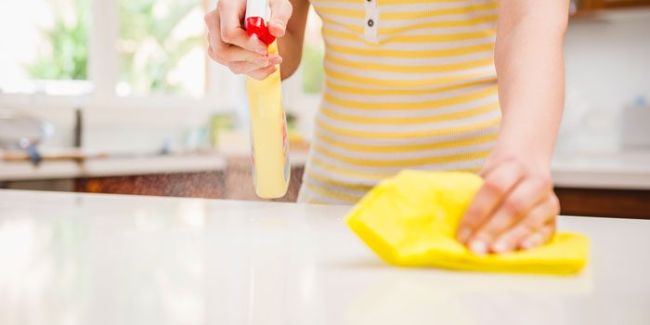Do you want to see your kitchen counters cleaned, or do you want to see them corroded?
If you’re using oven cleaners on your countertop.
Then beware that they contain chemicals that permanently damage your kitchen counters’ sealant and material.
They worsen the stains and, instead of removing them, can leave your countertop permanently dull and discoloured.
Oven cleaners fade out the protective finishes and seep through the countertop surface, damaging its appearance, deteriorating its structure, and making it vulnerable to food contamination.
Of all the cleaning liquids in your kitchen, oven cleaners are the most unsuitable for cleaning your kitchen counters.
Continue reading to learn more about the harmful effects of oven cleaners on your kitchen countertops and your health.
Oven cleaner ingredients that stain the countertops

Nearly all oven cleaners contain lye that breaks down substances upon contact and alcohol, which dissolves varnishes and finishes.
1. Lye
Lye (or sodium hydroxide) is one of the most common constituents in oven cleaners, drain de-cloggers, and paint removers.
It has also been used for decomposing animal carcasses, indicating its strongly corrosive nature.
Since lye is used as a paint-removing agent, you should never apply it on any countertop that has been sealed or painted with a clear finish.
This includes:
Wood
All wood countertops are protected with a thin layer of varnish that makes them glossy and water-resistant and deters the absorption of bacteria and other microbes.
Lye wears out that finish and may even turn it gummy and sticky upon contact, leaving permanent stains.
The stains will not disappear, and you must get your wooden countertop sanded and refinished.
The pores in the finish will also multiply the risk of food contamination and exposure to bacteria.
Natural stone
Countertops made from granite and marble are usually stronger and able to resist harsh cleansers, albeit only for once.
Since stone countertops are also porous, they are sealed with polyurethane to prevent the absorption of bacteria and water.
After being repeatedly exposed to lye, the protective seal gets damaged and causes stains and discolouration.
Lye also degrades the top glaze and breaks down the grout, which sets tile countertops in place.
Aluminium and steel
Lye reacts with metallic surfaces causing permanent discolouration.
It may also release corrosive gases which hurt the eyes and skin.
It dampens the natural lustre of stainless steel and Aluminum countertops.
That’s why lye-based oven cleaners should never be used to clean metal counters or containers.
Composite material
Formica Countertops are made from thermally fused polymer resins, painted or laminated to imitate the appearance of stone or wood.
The lye damages the finish causing permanent spots and discolouration and making the material weaker and more prone to chipping.
2. Alcohol
Oven cleaners may contain either one or both types of alcohol: MEA (monoethanolamine) or ethanol.
These powerful solvents can permanently tarnish countertops made of composite materials, such as Formica, vinyl, or Corian.
The alcohol is not as likely to produce visible damage on marble or stone countertops, but it can remove the protective veneer of wooden countertops.
Related Reading: What Is The Effect Of Oven Cleaner On Kitchen Countertops – Click Here To Find Out.
Health hazards of using oven cleaners on countertops
The different chemical compounds in oven cleaners can pose a health risk in many ways.
- Corrosive substances can cause chemical burns. Even in diluted form, they can produce skin allergies and rashes.
- Volatile organic compounds (VOCs) discharge toxic fumes into the environment. They can give you dizziness, headaches, difficulty breathing, or asthma attacks if inhaled in large quantities.
- Toxic or poisonous substances are dangerous for health and potentially lethal when ingested. Traces of oven cleaners can stay on the countertop or be absorbed by porous surfaces like wood or stone.
- Carcinogenic agents in oven cleaners have been associated with higher cancer risk.
Tips for fixing the stains caused by oven cleaners

- Use vinegar. Treat the area with vinegar if you accidentally spill oven cleaner on your countertop. Vinegar contains acid, which can help neutralize lye, slowing down its damage.
- Apply baking soda solution. You can clean the stains on marble and granite countertops with baking soda and water. Do not scrub since baking soda has an abrasive tendency. Instead, apply it gently on the affected area, cover it with a plastic sheet, and leave it for some days.
- Mix dishwashing soap and baking soda. You can clean light stains from steel surfaces with baking soda and dish soap paste. Rub the affected area with a soft towel and wipe it in the direction of the grain.
- Polish with beeswax for stains left on wooden or laminate countertops. This will help restore the shine, leaving a protective layer that blocks off bacteria and water. Applying polishing oils can also help conceal discolouration.
These techniques can help minimize or hide the stains caused by oven cleaners.
However, some marks may be too stubborn to remove, and discolouration might be permanent.
In that case, you can refurbish your countertops and restore them to their original look by creating a protective film that will hinder further damage.
Related Reading: Best Hot Plates For Quartz Countertops – Click Here To Find Out.
Does Oven Cleaner Stain Countertops – FAQs
1. Can I use oven cleaner on laminate countertops?
Unlike other materials, laminate countertops have less chance of corroding or getting stains.
But the oven cleaner can still fade out its colour, so it is better to use it cautiously.
2. Is it safe to use oven cleaner on steel countertops?
The corrosive chemicals can ruin the surface of the stainless steel countertop.
You can use water, soap, a microfiber towel or a surface cleaning liquid to clean this countertop.
3. What surfaces can you clean using oven cleaner?
Apart from ovens, an oven cleaner does a great job removing burned-on, old food residues from the surfaces of a stovetop.
Related Reading: Why Do Pans Warp In The Oven – Click Here To Read.
Conclusion
While the strong chemicals in oven cleaners may be suitable for removing all that sticky grease and slime in your oven, they can devastate your kitchen countertop.
They may even damage them permanently, not to mention the health hazards caused by them.
Hopefully, this post has convinced you that using oven cleaners on kitchen countertops is a big no-no.

